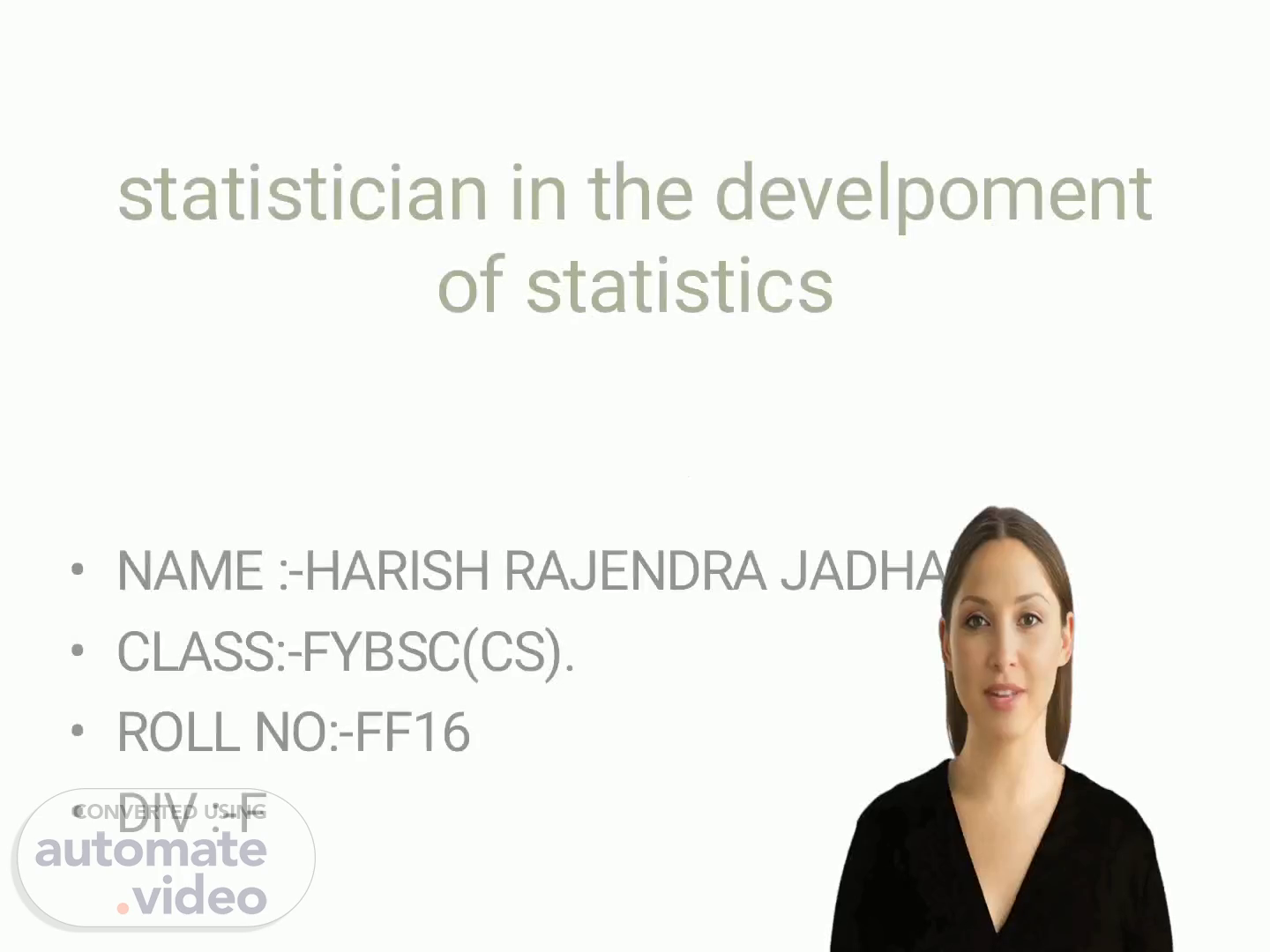Scene 1 (0s)
[Virtual Presenter] statistician in the develpoment of statistics NAME :-HARISH RAJENDRA JADHAV. CLASS:-FYBSC(CS). ROLL NO:-FF16 DIV :-F.
Scene 2 (17s)
[Virtual Presenter] Introduction Statistics simply means numerical data and is a field of math that generally deals with the collection of data, tabulation, and interpretation of numerical data. It is actually a form of mathematical analysis that uses different quantitative models to produce a set of experimental data or studies of real life. It is an area of applied mathematics concerned with data collection analysis, interpretation, and presentation. Statistics deals with how data can be used to solve complex problems. Some people consider statistics to be a distinct mathematical science rather than a branch of mathematics..
Scene 3 (1m 0s)
[Virtual Presenter] INDIAN STATISTAIN. INDIAN STATISTAIN.
Scene 4 (1m 6s)
[Audio] Vasant Shankar Huzurbazar 15 September 1919 – 15 November 1991) was an Indian statistician from Kolhapur. Huzurbazar was the founder head of the department of statistics, University of Pune from 1953 to 1976.[ ] From 1979 to 1991, he served as professor at University of Denver, Colorado until his death.[ ] He served as visiting professor for two years to the Iowa State University in 1962.[ ] In 1974, Huzurbazar was awarded the Padma Bhushan from Government of India for his contributions to the field of statistics.[1] In 1983 he was elected as a Fellow of the American Statistical Association.[2].
Scene 5 (1m 56s)
[Audio] Vasant Shankar Huzurbazar. Vasant Shankar Huzurbazar.
Scene 6 (2m 2s)
[Audio] Career[edit] Huzurbazar completed his high school from Rajaram High school, Kolhapur.[ ] He did his B.Sc. from University of Mumbai and M.Sc. in statistics from Banaras Hindu University during 1940–1941.[ ] Huzurbazar earned his Ph.D. in statistics from University of Cambridge in 1950; his advisor was Harold Jeffreys. Huzurbazar worked in the Gauhati University, Lucknow University and also in the Bureau of Economics and Statistics of Government of Bombay.
Scene 7 (2m 43s)
[Audio] Anil Kumar Gain. Anil Kumar Gain.
Scene 8 (2m 51s)
[Audio] FRSS FCPS (1 February 1919 – 7 February 1978) (also spelt Anil Kumar Gayen) was an Indian mathematician and statistician best known for his works on the Pearson product-moment correlation coefficient in the field of applied statistics, with his colleague Ronald Fisher. He received his Ph.D. from the University of Cambridge under the supervision of Henry Ellis Daniels, who was the then President of the Royal Statistical Society. He was honoured as a Fellow of the Royal Statistical Society and the Cambridge Philosophical Society.[2].
Scene 9 (3m 32s)
[Audio] Early life[edit] Anil Kumar Gain was born in a poor Bengali family of a village named Lakkhi in Purba Medinipur, West Bengal, to Jibankrishna Gain and Panchami Devi. His father having died in his childhood, he and his siblings were brought up by his widowed mother under economic hardship. He started his education in an informal local school and was admitted to a formal school when he was eight. In his schooldays, he showed particular interest in English and mathematics, subjects he was primarily taught by his mother. Upon finishing school, he travelled to Kolkata to study mathematics from Surendranath College, followed by a master's degree in applied mathematics from the Rajabazar Science College, University of Calcutta. He was declared the University Gold Medalist for the year 1943.[4].
Scene 10 (4m 30s)
[Audio] FOREIGN STATISTIAN. FOREIGN STATISTIAN.
Scene 11 (4m 36s)
[Audio] William Sealy Gosset. William Sealy Gosset.
Scene 12 (4m 43s)
[Audio] (13 June 1876 – 16 October 1937) was an English statistician, chemist and brewer who served as Head Brewer of Guinness and Head Experimental Brewer of Guinness and was a pioneer of modern statistics. He pioneered small sample experimental design and analysis with an economic approach to the logic of uncertainty. Gosset published under the pen name Student and developed most famously Student's t-distribution – originally called Student's "z" – and "Student's test of statistical significance". Life and career[edit] Born in Canterbury, England the eldest son of Agnes Sealy Vidal and Colonel Frederic Gosset, R.E. Royal Engineers, Gosset attended Winchester College before matriculating as Winchester Scholar in natural sciences and mathematics at New College, Oxford. Upon graduating in 1899, he joined the brewery of Arthur Guinness & Son in Dublin, Ireland; he spent the rest of his 38-year career at Guinness.[1][2] Gosset had three children with Marjory Gosset (née Phillpotts). Harry Gosset (1907–1965) was a consultant paediatrician; Bertha Marian Gosset (1909–2004) was a geographer and nurse; the youngest, Ruth Gosset (1911–1953) married the Oxford mathematician Douglas Roaf and had five children.
Scene 13 (6m 22s)
[Audio] Karl Pearson. Karl Pearson.
Scene 14 (6m 29s)
[Audio] BornCarl Pearson 27 March 1857 Islington, London, England Died27 April 1936 (aged 79) Coldharbour, Surrey, England Alma materKing's College, Cambridge University of Heidelberg University of Berlin AwardsDarwin Medal (1898) Weldon Memorial Prize (1912) Scientific careerFieldsLawyer, Germanist, eugenicist, mathematician and statistician (primarily the last)InstitutionsUniversity College London University of Cambridge Academic advisorsFrancis GaltonNotable studentsPhilip Hall John Wishart Julia Bell Nicholas Georgescu-Roegen.
Scene 15 (7m 15s)
[Audio] Pearson was born in Islington, London, into a Quaker family. His father was William Pearson QC of the Inner Temple, and his mother Fanny (née Smith), and he had two siblings, Arthur and Amy. Pearson attended University College School, followed by King's College, Cambridge, in 1876 to study mathematics,[5] graduating in 1879 as Third Wrangler in the Mathematical Tripos. He then travelled to Germany to study physics at the University of Heidelberg under G. H. Quincke and metaphysics under Kuno Fischer. He next visited the University of Berlin, where he attended the lectures of the physiologist Emil du Bois-Reymond on Darwinism (Emil was a brother of Paul du Bois-Reymond, the mathematician). Pearson also studied Roman Law, taught by Bruns and Mommsen, medieval and 16th century German Literature, and Socialism. He became an accomplished historian and Germanist and spent much of the 1880s in Berlin, Heidelberg.
Scene 16 (8m 26s)
[Audio] THANK YOU!!!!!. THANK YOU!!!!!.
